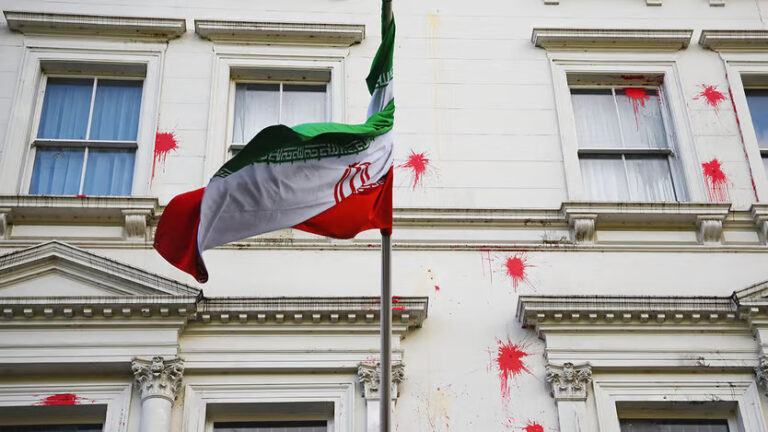By NBC News’ Edmund Flanagan and Eric Baculinao
BEIJING – After months of tense relations, China is showing new willingness to engage in talks with the United States, a diplomatic opening that may help the Obama administration achieve U.N. consensus on tightening sanctions on Iran.
“It was a remarkable change,” said Shi Yinhong, an international affairs professor at China’s Renmin University, “a stunning adjustment of China’s policies.
Shi was referring to the fast-paced diplomacy that observers say may have changed the dynamic of the Iranian nuclear issue entirely, and brought new momentum to U.S.-China ties after months of bitter disputes.
China’s new willingness to discuss another round of Iran sanctions has led experts to observe that Tehran could no longer depend on its trump card, its good ties with China to shield its controversial nuclear program.
Importance of China-U.S. relations
Just as Iran’s chief nuclear negotiator Saeed Jalili was arriving in Beijing on Thursday, U.S. Ambassador Jon Huntsman was inside the Chinese Foreign Ministry to hear the surprise news. Despite the diplomatic clashes over Taiwan, Tibet, Google, currency manipulation and other disputes, President Hu Jintao will attend the nuclear security summit President Barack Obama is hosting in Washington later this month to discuss the possibility of a fresh round of U.N. sanctions against Iran.
Opposing nuclear proliferation and nuclear terrorism is a core part of Obama’s agenda, and if China, a major nuclear power, had been absent from the negotiating table, it would have been an embarrassing setback. So the fact that China agreed to attend the meeting was hailed as a sign of progress and an easing of tensions between the two big powers.
The White House said Friday the United States was consulting with China on ratcheting up pressure on Iran and imposing further scansions over its nuclear program. Spokesman Robert Gibbs said Washington was pleased with the progress made so far.
Despite the awkward timing of Jalili’s arrival in Beijing, it was hard to sense any panic or frustration in the Iranian’s voice about the latest developments during a press conference he had with local media on Friday. Talk of sanctions and even a question from one reporter asking whether the “Chinese had betrayed Iran?” were answered with a composure and conciliation toward his Chinese hosts.
Jalili dismissed suggestions that China was jumping on board to support new U.N. sanctions aimed at stemming Iran’s nuclear program. “In our talks with China it was agreed that tools such as sanctions have lost their effectiveness,” Jalili said during the news conference.
For its part, Beijing remained non-committal on the sanctions issue. Rather, the Chinese Foreign Ministry said Friday that all parties should “step up diplomatic efforts, and show flexibility, to create the conditions to resolve the Iranian nuclear issue through dialogue and negotiation.”
But according to Shi, the Renmin professor, the latest development clearly shows how China is prioritizing its ties with Washington – above Iran. China’s changing stance on Tehran is “part of efforts to improve relations with the United States,” Shi said.
The geo-politics of oil
In the last decade, China’s energy and strategic interests in Iran have become increasingly intertwined, with Iran supplying China with 11 percent of its oil needs. In recent years, Tehran has signed deals with Chinese companies to open and exploit Iran’s vast crude oil and gas reserves, the second biggest in the world, with some estimating that the Chinese have committed $120 billion to Iran’s energy sector.
Ironically, even as Iran boosts crude exports to China, it finds itself increasingly reliant on China for gasoline. Embargos and decrepit refineries have forced Iran to import from China nearly a third of its petrol supply. China has also become Iran’s largest trading partner.
For years Tehran has counted on China’s veto power in the U.N. Security Council and its international diplomatic clout to shield it against severe international sanctions. Three previous rounds of sanctions were watered down to prevent a Chinese veto.
But according to Cliff Kupchan, a top Iran analyst with the political risk consultants Eurasia Group, times are changing. “Iran’s main leverage has been oil, but global supply is now robust and Saudi spare capacity could replace Iranian supplies to China,” Kupchan said.
“Iran has no longer an oil trump card, as it did when markets were tight,” he added.
Negotiations vs. sanctions
China’s changing stance however “does not mean that it has given up on diplomacy and negotiations,” said Dr.Victor Gao, director of the China National Association of International Studies
“China is firmly opposed to any nuclear weapons proliferation in the Middle East, but there has been no firm indication, despite some reports from other quarters, that China believes that diplomacy and negotiations have been fully exhausted,” Gao said. “We are not at that stage yet, China will keep pushing for negotiations and diplomacy for this unfolding situation, including at the Washington summit,” he added.
Still Kupchan estimates that, “China will probably agree to targeted sanctions against the Iranian Revolutionary Guards, but not harsher trade-related measures.”
“Iran will likely react to a new sanctions resolution provocatively, this regime is very risk-acceptant,” Kupchan added, citing possible moves such as claiming bomb-grade low-enriched uranium or building faster centrifuges.
“I doubt there will be more than one, perhaps two, future U.N. sanctions resolutions against Iran,” he said, projecting that “the focus will then shift to ‘coalition of the willing’ U.S.-led sanctions and direct U.S. sanctions on Iran.”
Source: NBC News







+ There are no comments
Add yours